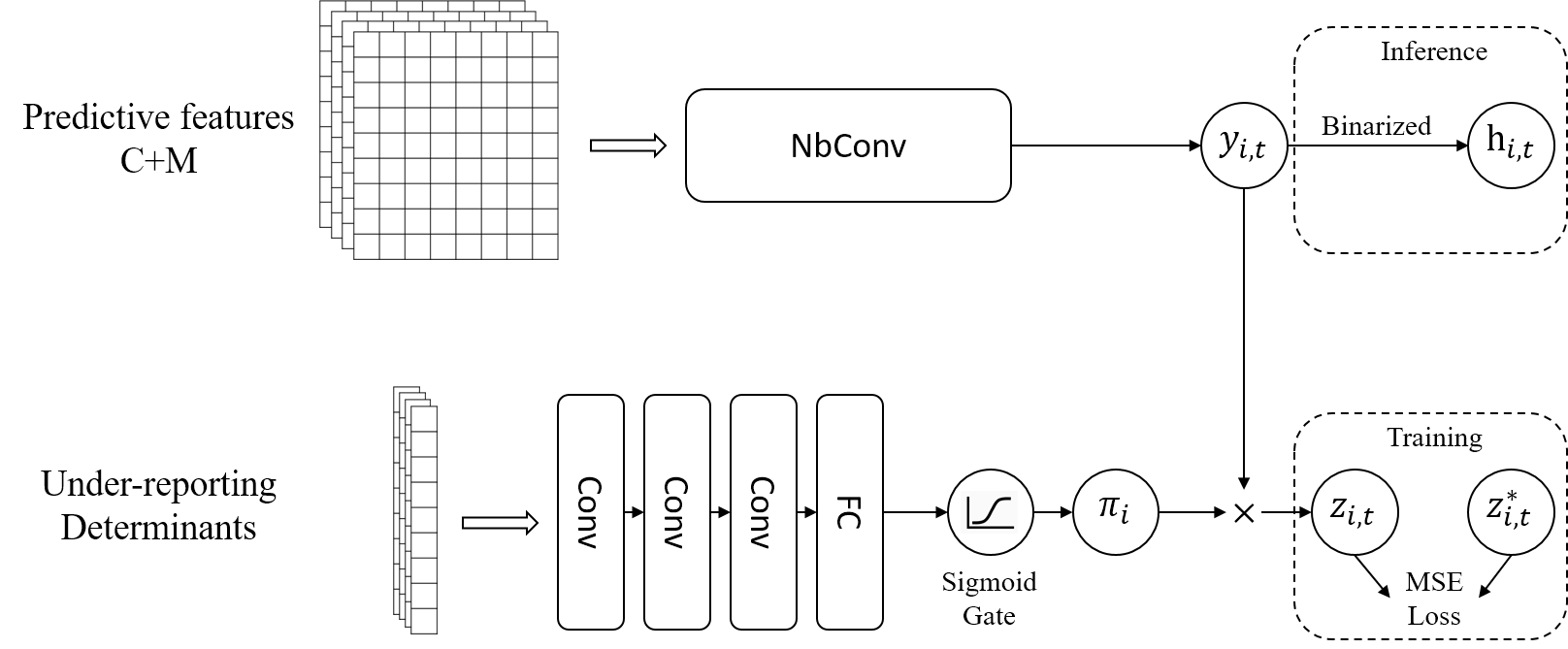Improving the Fairness of Deep-Learning, Short-term Crime Prediction with Under-reporting-aware Models
2406.04382

0
0

Abstract
Deep learning crime predictive tools use past crime data and additional behavioral datasets to forecast future crimes. Nevertheless, these tools have been shown to suffer from unfair predictions across minority racial and ethnic groups. Current approaches to address this unfairness generally propose either pre-processing methods that mitigate the bias in the training datasets by applying corrections to crime counts based on domain knowledge or in-processing methods that are implemented as fairness regularizers to optimize for both accuracy and fairness. In this paper, we propose a novel deep learning architecture that combines the power of these two approaches to increase prediction fairness. Our results show that the proposed model improves the fairness of crime predictions when compared to models with in-processing de-biasing approaches and with models without any type of bias correction, albeit at the cost of reducing accuracy.
Create account to get full access
Overview
- This paper proposes an approach to improve the fairness of deep learning models for short-term crime prediction, addressing the issue of underreporting of crimes.
- The researchers develop under-reporting-aware models that account for the biases in crime data, leading to more equitable predictions across different demographic groups.
- The paper evaluates the proposed models on real-world crime data and demonstrates their effectiveness in mitigating fairness issues compared to traditional crime prediction models.
Plain English Explanation
Crime prediction models based on deep learning have become increasingly common, but they can suffer from unfairness issues due to biases in the underlying crime data. One significant source of bias is the underreporting of crimes, which can vary across different demographic groups.
To address this problem, the researchers in this paper have developed under-reporting-aware models that take into account the uneven reporting of crimes. By incorporating this information, the models are able to make more equitable predictions and avoid disproportionately targeting certain communities.
The paper evaluates these new models on real-world crime data and demonstrates that they outperform traditional crime prediction approaches in terms of fairness across different demographic groups. This is an important step towards enhancing the fairness of neural networks used for high-stakes applications like crime forecasting.
Technical Explanation
The researchers first identify the problem of underreporting in crime data, which can lead to unfair models trained on Indian legal data. To address this, they propose under-reporting-aware models that explicitly account for the varying rates of crime reporting across different demographic groups.
The proposed approach involves training the deep learning model with an additional loss term that penalizes unfair predictions. This loss term is derived from a fairness metric that measures the disparity in predictions across different demographic groups. By optimizing for this fairness-aware loss, the model learns to make more equitable predictions that close the gap in the trade-off between fair representations.
The researchers evaluate their under-reporting-aware models on real-world crime data, demonstrating that they outperform traditional crime prediction models in terms of fairness across different demographic groups. They also analyze the dual impact of privacy and fairness in their approach.
Critical Analysis
The paper presents a compelling approach to address the fairness issues in deep learning-based crime prediction models. By accounting for the underreporting of crimes, the proposed under-reporting-aware models are able to make more equitable predictions across different demographic groups.
One potential limitation of the study is the reliance on historical crime data, which may still contain inherent biases and underreporting issues. The researchers acknowledge this and suggest exploring alternative data sources or techniques to further mitigate these biases.
Additionally, the paper does not provide a detailed analysis of the computational complexity or resource requirements of the under-reporting-aware models. This information would be valuable for assessing the practical feasibility of deploying such models in real-world settings.
Further research could also explore the generalizability of the proposed approach to other high-stakes applications beyond crime prediction, where fairness and privacy are critical considerations.
Conclusion
This paper presents a novel approach to improving the fairness of deep learning-based crime prediction models by developing under-reporting-aware models. These models explicitly account for the biases in crime data caused by uneven reporting, leading to more equitable predictions across different demographic groups.
The empirical evaluation on real-world data demonstrates the effectiveness of the proposed approach in mitigating fairness issues compared to traditional crime prediction models. This research represents an important step towards enhancing the fairness of neural networks used in high-stakes applications, with potential implications for improving the fairness and accountability of predictive policing systems.
This summary was produced with help from an AI and may contain inaccuracies - check out the links to read the original source documents!
Related Papers

Network-Based Transfer Learning Helps Improve Short-Term Crime Prediction Accuracy
Jiahui Wu, Vanessa Frias-Martinez

0
0
Deep learning architectures enhanced with human mobility data have been shown to improve the accuracy of short-term crime prediction models trained with historical crime data. However, human mobility data may be scarce in some regions, negatively impacting the correct training of these models. To address this issue, we propose a novel transfer learning framework for short-term crime prediction models, whereby weights from the deep learning crime prediction models trained in source regions with plenty of mobility data are transferred to target regions to fine-tune their local crime prediction models and improve crime prediction accuracy. Our results show that the proposed transfer learning framework improves the F1 scores for target cities with mobility data scarcity, especially when the number of months of available mobility data is small. We also show that the F1 score improvements are pervasive across different types of crimes and diverse cities in the US.
6/17/2024

DemOpts: Fairness corrections in COVID-19 case prediction models
Naman Awasthi, Saad Abrar, Daniel Smolyak, Vanessa Frias-Martinez

0
0
COVID-19 forecasting models have been used to inform decision making around resource allocation and intervention decisions e.g., hospital beds or stay-at-home orders. State of the art deep learning models often use multimodal data such as mobility or socio-demographic data to enhance COVID-19 case prediction models. Nevertheless, related work has revealed under-reporting bias in COVID-19 cases as well as sampling bias in mobility data for certain minority racial and ethnic groups, which could in turn affect the fairness of the COVID-19 predictions along race labels. In this paper, we show that state of the art deep learning models output mean prediction errors that are significantly different across racial and ethnic groups; and which could, in turn, support unfair policy decisions. We also propose a novel de-biasing method, DemOpts, to increase the fairness of deep learning based forecasting models trained on potentially biased datasets. Our results show that DemOpts can achieve better error parity that other state of the art de-biasing approaches, thus effectively reducing the differences in the mean error distributions across more racial and ethnic groups.
5/21/2024
🧠
Enhancing Fairness in Neural Networks Using FairVIC
Charmaine Barker, Daniel Bethell, Dimitar Kazakov

0
0
Mitigating bias in automated decision-making systems, specifically deep learning models, is a critical challenge in achieving fairness. This complexity stems from factors such as nuanced definitions of fairness, unique biases in each dataset, and the trade-off between fairness and model accuracy. To address such issues, we introduce FairVIC, an innovative approach designed to enhance fairness in neural networks by addressing inherent biases at the training stage. FairVIC differs from traditional approaches that typically address biases at the data preprocessing stage. Instead, it integrates variance, invariance and covariance into the loss function to minimise the model's dependency on protected characteristics for making predictions, thus promoting fairness. Our experimentation and evaluation consists of training neural networks on three datasets known for their biases, comparing our results to state-of-the-art algorithms, evaluating on different sizes of model architectures, and carrying out sensitivity analysis to examine the fairness-accuracy trade-off. Through our implementation of FairVIC, we observed a significant improvement in fairness across all metrics tested, without compromising the model's accuracy to a detrimental extent. Our findings suggest that FairVIC presents a straightforward, out-of-the-box solution for the development of fairer deep learning models, thereby offering a generalisable solution applicable across many tasks and datasets.
4/30/2024
📊
Are Models Trained on Indian Legal Data Fair?
Sahil Girhepuje, Anmol Goel, Gokul S Krishnan, Shreya Goyal, Satyendra Pandey, Ponnurangam Kumaraguru, Balaraman Ravindran

0
0
Recent advances and applications of language technology and artificial intelligence have enabled much success across multiple domains like law, medical and mental health. AI-based Language Models, like Judgement Prediction, have recently been proposed for the legal sector. However, these models are strife with encoded social biases picked up from the training data. While bias and fairness have been studied across NLP, most studies primarily locate themselves within a Western context. In this work, we present an initial investigation of fairness from the Indian perspective in the legal domain. We highlight the propagation of learnt algorithmic biases in the bail prediction task for models trained on Hindi legal documents. We evaluate the fairness gap using demographic parity and show that a decision tree model trained for the bail prediction task has an overall fairness disparity of 0.237 between input features associated with Hindus and Muslims. Additionally, we highlight the need for further research and studies in the avenues of fairness/bias in applying AI in the legal sector with a specific focus on the Indian context.
5/15/2024